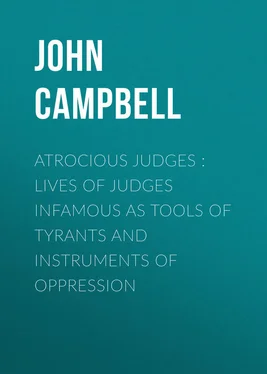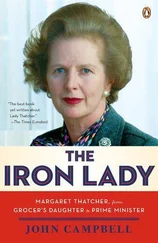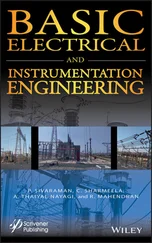John Campbell - Atrocious Judges - Lives of Judges Infamous as Tools of Tyrants and Instruments of Oppression
Здесь есть возможность читать онлайн «John Campbell - Atrocious Judges - Lives of Judges Infamous as Tools of Tyrants and Instruments of Oppression» — ознакомительный отрывок электронной книги совершенно бесплатно, а после прочтения отрывка купить полную версию. В некоторых случаях можно слушать аудио, скачать через торрент в формате fb2 и присутствует краткое содержание. Жанр: foreign_antique, foreign_prose, Биографии и Мемуары, на английском языке. Описание произведения, (предисловие) а так же отзывы посетителей доступны на портале библиотеки ЛибКат.
- Название:Atrocious Judges : Lives of Judges Infamous as Tools of Tyrants and Instruments of Oppression
- Автор:
- Жанр:
- Год:неизвестен
- ISBN:нет данных
- Рейтинг книги:5 / 5. Голосов: 1
-
Избранное:Добавить в избранное
- Отзывы:
-
Ваша оценка:
- 100
- 1
- 2
- 3
- 4
- 5
Atrocious Judges : Lives of Judges Infamous as Tools of Tyrants and Instruments of Oppression: краткое содержание, описание и аннотация
Предлагаем к чтению аннотацию, описание, краткое содержание или предисловие (зависит от того, что написал сам автор книги «Atrocious Judges : Lives of Judges Infamous as Tools of Tyrants and Instruments of Oppression»). Если вы не нашли необходимую информацию о книге — напишите в комментариях, мы постараемся отыскать её.
Atrocious Judges : Lives of Judges Infamous as Tools of Tyrants and Instruments of Oppression — читать онлайн ознакомительный отрывок
Ниже представлен текст книги, разбитый по страницам. Система сохранения места последней прочитанной страницы, позволяет с удобством читать онлайн бесплатно книгу «Atrocious Judges : Lives of Judges Infamous as Tools of Tyrants and Instruments of Oppression», без необходимости каждый раз заново искать на чём Вы остановились. Поставьте закладку, и сможете в любой момент перейти на страницу, на которой закончили чтение.
Интервал:
Закладка:
As the law and its practice thus became more and more a mystery, only to be learned by frequenting the courts of Westminster Hall, and by the study of the obscure and ill-prepared reports of their proceedings, which began now to be compiled by official reporters, and published under the name of Year Books, the old local Anglo-Saxon courts fell still more into contempt. Already in the reign of Henry III. the freeholders had been released from their obligation of attendance upon them, and another blow was given to these ancient tribunals when, in the reign of Edward II., the appointment of sheriffs, hitherto chosen by the freeholders, was assumed by the crown; and still another when, in the following reign, the election of conservators of the peace was also taken from the people and assumed by the king. To the magistrates thus appointed by the king the new name of Justices of the Peace was soon afterwards given, and the criminal jurisdiction conferred upon them, whether acting singly as examining and committing magistrates, or met together at the courts of Quarter Sessions, gradually superseded the small remains of criminal authority hitherto left to the old popular tribunals.
Two circumstances, however, combined to transfuse a certain portion of the spirit of these old tribunals into the newly established courts, thus standing in the way of the entire monopoly of the administration of justice at which the lawyers aimed, and securing to the body of the people a certain participation in the most important function of the government, to wit, the administration of justice; which participation, derived from the old Anglo-Saxon customs, and transmitted to our times, constitutes to-day the main pillar of both British and American liberty.
Contemporaneously with the new organization above described of the courts of common law, the British Parliament had taken upon itself that organization which it still retains – an upper house, (House of Lords,) composed of great nobles and bishops, 12 12 Down to the period of the reformation the abbots of the greater monasteries sat also in this house.
successor of the Anglo-Saxon Wittenagemote and of the Anglo-Norman Great Council, and a lower house, (House of Commons,) in which met together the elected representatives of the smaller landed proprietors, holding by knight’s service immediately of the crown, (knights of the shire,) together with the newly-admitted representatives of the cities and chief towns, (burgesses.) The Parliament thus constituted claimed and exercised, probably as successor of the Wittenagemote, appellate jurisdiction from the decisions of all the courts of law. In the time of Edward III. it was even a common practice for the judges, when any question of difficulty arose in their several courts, to take the advice of Parliament on it before giving judgment. Thus in a case mentioned in the Year Book, 40 Ed. III., Thorpe, chief justice of the King’s Bench, went with another judge to the House of Lords, to inquire the meaning and effect of a law they had just passed for amending the system of pleadings; 13 13 If the Lords, says Campbell, were still liable to be so interrogated, they would not unfrequently be puzzled; and the revival of the practice might be a check on hasty legislation. It certainly would be a check upon the practice of courts, now so frequent, of putting an interpretation on statutes totally different from the intentions of those who frame them.
and many other instances occur of the same sort.
This appellate power vesting in Parliament from the decisions of all the courts was the first of the circumstances above alluded to as serving to prevent the monopoly of the administration of justice by the lawyers. But this check with the process of time has almost entirely disappeared. In England this appellate power in Parliament has long since fallen into the hands exclusively of the House of Lords, who themselves in giving judgment are ordinarily only the mouthpiece of the judges called in to give their advice. In what are now the United States of America the same appellate jurisdiction was originally exercised by the colonial assemblies. With us, however, it has entirely vanished under the influence of the idea of a total separation of the legislative, executive, and judicial functions.
The other, and by far the most important check upon the monopoly of the lawyers, was the introduction and gradual perfecting of the trial by jury, by which the more ancient methods – the compurgation and ordeal of the Anglo-Saxons, and the trial by battle, the favorite method of the Anglo-Normans – were entirely superseded. The history of the trial by jury is exceedingly obscure. The petit jury may, however, be traced back to the old Anglo-Saxon method of trial by compurgation, the jury in its origin being only a body of witnesses drawn from the vicinage, who founded their verdict not upon the evidence of witnesses given before them, but upon their own personal knowledge of the matters in dispute. 14 14 Hence the necessity of venue, that is, the allegation in all declarations and indictments of some place in some county where the matter complained of happened, in order to a trial by a jury of the vicinage. In personal actions this necessity of trying a case in the county where the transaction occurred was got rid of by first setting out the true place of the transaction, and then alleging under a videlicet a venue in the county where the action was brought, which latter allegation the courts would not allow to be disputed. But in criminal proceedings and real actions the necessity of a trial in the county where the offence was committed or the land lies still continues. The origin of the jury in a body of neighbors who decided from their own knowledge will seem less remarkable when we recollect that by the customs of the Anglo-Saxons all sales of land, contracts, &c., between individuals took place in public at the hundred and county courts, the memory of the freeholders present thus serving in place of written records. See Palgrave’s English Commonwealth , vol. i. p. 213.
The grand jury seems to have originated in the old Anglo-Saxon custom imbodied in one of the laws of Ethelred, by which was imposed upon the twelve senior thanes of every hundred the duty of discovering and presenting the perpetrators of all crimes within their district – a custom revived by the constitution of Clarendon, enacted A. D. 1164, by which twelve lawful men of the neighborhood were to be sworn by the sheriff, on the requisition of the bishop, to investigate all cases of suspected criminality as to which no individual dared to make an accusation. At first this accusing jury seems also to have served the purpose of a jury of trial. In what way the grand jury came to be separated from the petit jury, and how the former came to be increased to a number not exceeding twenty-three, of whom at least twelve must concur in order to find an indictment, is a point which still remains for the investigation of legal antiquaries. 15 15 See Forsyth’s Trial by Jury , ch. x. sec. 1.
The trial by jury, though of the progress of its development little is known, appears to have taken on substantially its existing form, both in civil and criminal cases, nearly contemporaneously with the new organization of the English courts, with the rise of the legal profession as distinct from that of the clergy, and with the commencement of the series of English statutes and law reports – all of which, as well as the existing constitution of the British House of Commons, may be considered as dating from the accession of Edward I., A. D. 1272, or somewhat less than six hundred years ago. In certain cases of great importance this trial took place and still takes place in bank, as it is called; that is, in Westminster Hall, before all the judges of the court in which the suit is pending; 16 16 Down to the time of Elizabeth all cases occurring in Middlesex county, in which Westminster lies, were thus tried in bank.
but in general, the trial is had in the county in which (if a criminal case) the offence had been committed, or (if a civil case) in which the venue is laid, before certain commissioners sent into the counties for that purpose, and who, under the new system, were the successors of the justices in eyre, or itinerant justices, who had formed a part of the ancient Aula Regis. Originally, separate commissions appear to have issued for criminal and civil cases – for the former a commission of oyer and terminer, (to hear and determine,) and of general jail delivery; and for the latter a commission of assize, so called from the name of a peculiar kind of jury trial introduced as a substitute for trial by battle, in real actions, that is, pleas relating to land, villainage, and advowsons. In the times in which land, villains, and the right of presentation to parishes, constituted the chief wealth, these real actions constituted also the chief business of the Common Pleas, which then had exclusive jurisdiction of civil controversies; but to this commission of assize was annexed another, called a commission of nisi prius , authorizing the commissioners to try all questions of fact arising in any of the courts of Westminster. This latter commission was so called because the writ issued to the sheriff of the county in which the cause of action was alleged to have originated, to summon a jury to try the case, directed such jury to be summoned to appear at Westminster on a day named, unless before (in Latin, nisi prius ) that day commissioners should come into the county to try the case there. Hence the term nisi prius employed by lawyers to designate a trial by jury before one or more judges, commissioned to hold such trials within certain circuits, but whose directions to the jury, and other points of law decided by them in the course of the trial, are liable afterwards to be reviewed by the whole bench.
Интервал:
Закладка:
Похожие книги на «Atrocious Judges : Lives of Judges Infamous as Tools of Tyrants and Instruments of Oppression»
Представляем Вашему вниманию похожие книги на «Atrocious Judges : Lives of Judges Infamous as Tools of Tyrants and Instruments of Oppression» списком для выбора. Мы отобрали схожую по названию и смыслу литературу в надежде предоставить читателям больше вариантов отыскать новые, интересные, ещё непрочитанные произведения.
Обсуждение, отзывы о книге «Atrocious Judges : Lives of Judges Infamous as Tools of Tyrants and Instruments of Oppression» и просто собственные мнения читателей. Оставьте ваши комментарии, напишите, что Вы думаете о произведении, его смысле или главных героях. Укажите что конкретно понравилось, а что нет, и почему Вы так считаете.












